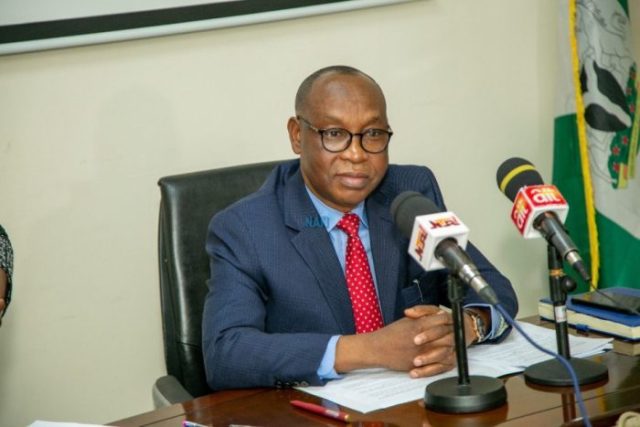NEWS
Gas to play a role in Nigeria's energy transition

Nigeria has the largest gas reserves in Africa and the 9th largest in the world.
The Nigerian Extractive Industries Transparency Initiative (NEITI) is optimistic that gas will play a major role in Nigeria's transition to cleaner energy sources.
And this even as it emphasizes the need for technology, innovation, exploration, production and marketing of gas to enable the country to reach its 2060 net-zero emissions target.
NEITI's Executive Secretary, Dr. Orji Ogbonnaya Orji, said this while speaking as a special guest at the 2nd German-Nigerian Green Hydrogen Symposium held in Abuja, and also asserted that with its gas reserves of 200,000 billion cubic feet, Nigeria can use natural gas as a transitional fuel.
"Nigeria has identified natural gas as a transitional fuel. With over 200,000 billion cubic feet, Nigeria has the largest gas reserves in Africa and the 9th largest in the world. And with the increase in new gas discoveries from frontier explorations underway across the country.
"NEITI believes that gas will play a very important role in the energy transition debate. As you know, gas has the potential to produce blue hydrogen which, while not as clean as green hydrogen, would be useful in our move towards cleaner energy sources.
The NEITI boss, however, deplored the rate of gas flaring, the country's growing environmental pollution as well as incessant revenue losses and huge sums unpaid in gas flaring penalties, citing NEITI's recent oil and gas report which revealed unremitted revenues of over $8.2 billion. arising from the debts of government agencies and oil/gas companies.
"At a time when gas is rapidly overtaking crude oil in terms of revenue generation for resource-rich countries, the rate of gas flaring, with huge negative consequences for environmental pollution, is increasing in Nigeria.
"A breakdown of unpaid payments in the report shows unpaid gas royalties of $559.8 million and another $828.8 million in unpaid gas flaring penalties, confirming that more gas was flared in the country during the period than was used. The situation presents serious dangers for the global zero-emissions program, in addition to a huge loss of revenue for the country.
Orji further explained that the upsurge in gas flaring and the resulting loss of revenue to the country had motivated NEITI's willingness to support and encourage the Nigerian Upstream Petroleum Regulatory Commission (NUPRC) to accelerate the Commission's ongoing gas utilization and commercialization project.
Citing United Nations projections that Nigeria's population is expected to reach over 260 million by 2030 and over 400 million by 2050, Orji reiterated the urgent need for deliberate investment in gas technology, innovation, exploration, production and marketing if Nigeria is to meet its net requirements. target zero by 2060.
Regarding commitments to achieve net zero emissions by 2060, Dr. Orji said the country's commitment to net zero emissions includes policies that will help control the greenhouse gases produced in Nigeria, major reforms in energy production and use, concern for energy security, jobs, livelihoods, the economy and strong citizen engagement, as well as deliberate investment in the expansion of gas infrastructure.
He also reaffirmed NEITI's commitment to supporting the country's transition program with crucial facts, reliable information and data to guide its successful implementation, and welcomed the Symposium's objectives.
Earlier, Germany's ambassador to Nigeria, Ms. Annett Gunther, explained that the symposium had been convened by Germany as part of discussions with the Nigerian government by German Chancellor Olaf Scholz during his recent visit to Nigeria, as part of his country's commitment to supporting Nigeria's reduction of carbon emissions and diversification of its energy resources.
Also at the symposium, the Minister of State for the Environment, Dr. Iziaq Kunle Salako, welcomed the expansion of cooperation between Nigeria and Germany in the fields of energy security, diversification and environmental safety, and assured that the country was ready to take advantage of the opportunities offered by the A German-Nigerian symposium on green hydrogen will be held.
The Minister urged the Conference to come up with far-reaching recommendations that will help shape Nigeria's energy transition program.
-

 ANALYSIS1 an ago
ANALYSIS1 an agoThe 3 African countries richest in natural resources
-

 NEWS11 month ago
NEWS11 month agoTop 10 des pays africains producteur de l’or : Mali 2-eme, Burkina Faso 3-eme
-

 FOCUS ONA1 an ago
FOCUS ONA1 an agoThe 10 largest oil refineries in Africa
-

 FOCUS ONA11 month ago
FOCUS ONA11 month agoTop 10 oil producers in Africa in 2023
-

 NEWS2 ans ago
NEWS2 ans agoRanking of oil producers: Here are the Top 10 African countries.
-

 NEWS8 month ago
NEWS8 month agoAfrica's 10 largest natural gas production fields.
-

 NEWS2 ans ago
NEWS2 ans agoTop 20 oil producing countries in 2022
-

 NEWS10 month ago
NEWS10 month agoIvory Coast: Eni to deploy a cylindrical FPSO and a converted FSO on the Baleine oil field












